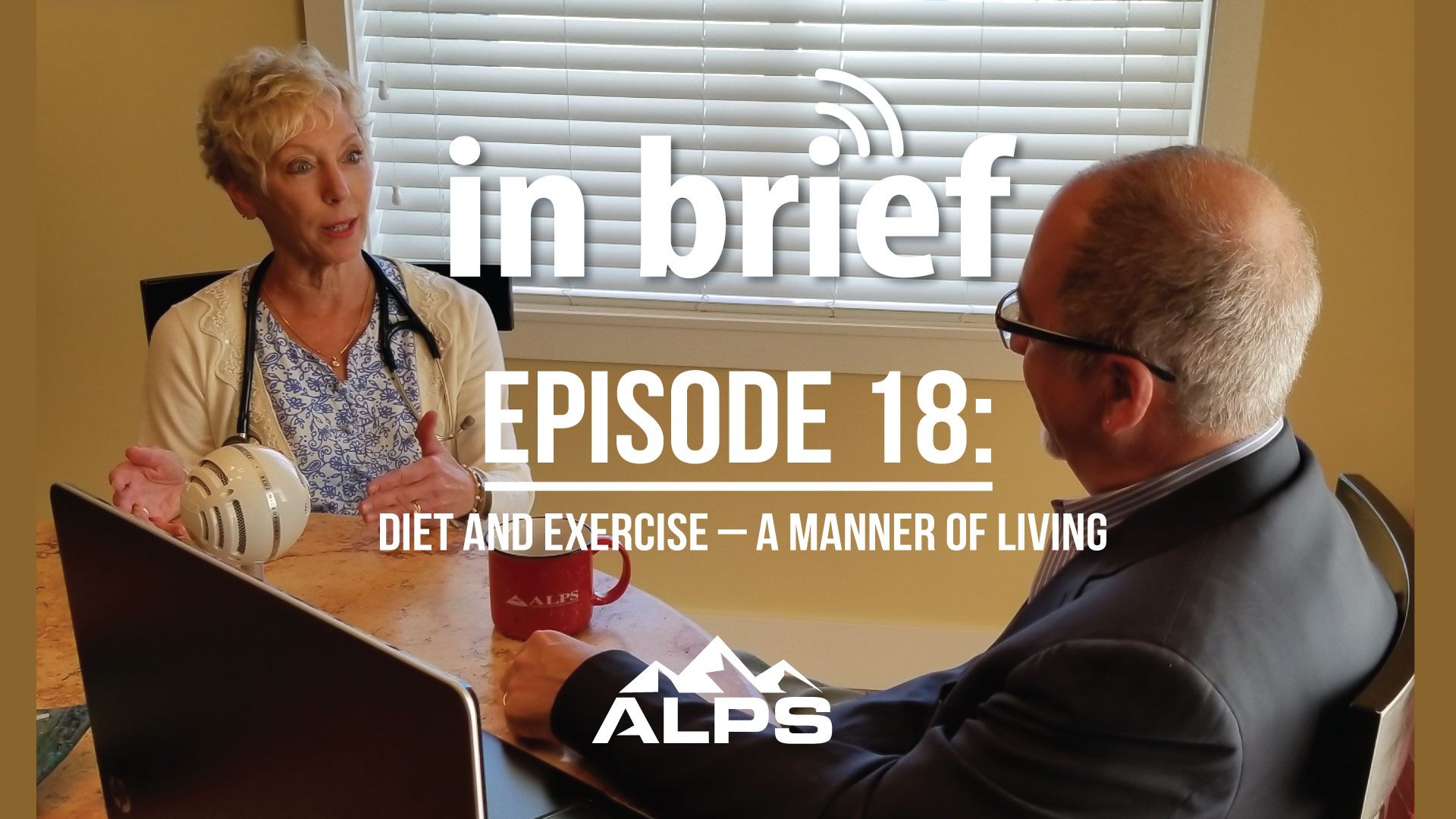ALPS In Brief Podcast – Episode 28: Making Healthy Goals into Realities
10 min read
 Mark Bassingthwaighte, Risk Manager
:
Updated on February 28, 2024 | Posted on January 31, 2019
Mark Bassingthwaighte, Risk Manager
:
Updated on February 28, 2024 | Posted on January 31, 2019

When our behaviors become destructive and start to negatively impact our health or relationships, we’re motivated to make a change, but change is hard! ALPS Risk Manager Mark Bassingthwaighte and Dr. Kathleen Baskett weigh the strategies and skills needed to make healthy changes against the risk factors that may sabotage your success.
Transcript
MARK:
Hello, this is Mark Bassingthwaighte and I’m the Risk Manager with ALPS insurance. Welcome to the latest episode of ALPS In Brief, the podcast that comes to you from the historic Florence building in beautiful downtown Missoula, Montana. Today, I’m pleased to have as our guest my favorite physician, Dr. Kathleen Baskett. We spoke … it’s been Kathy I think about, oh, I don’t know, six, nine months and we were, when we last visited, talking about weight management. And I’d like to talk today a little bit about change. But before we get into a brief conversation, can you just share a little bit about yourself again, for the benefit of our audience?
DR. BASKETT:
Of course, I would be happy to do so. I am the Medical Director of Weight Management Clinic at St. Vincent Health care in Billings, Montana. And I work with people who want to get healthier and work on healthy weight loss, whether it be losing weight non-surgically or through surgical weight loss methods.
MARK:
The last time we were talking about travel, and weight management, and the challenges people face. This time around, we’re at the time of year, at the end of the year, beginning of a new year coming here shortly, where people will make commitments to try to change and … I’ve got to go to the club now and start to work out, or I’m going to try to lose 15 pounds, or whatever it might be. But change can really be hard and I know a lot of your own patients are making commitments long term to really make some very, very significant changes. And I just initially would like some of your thoughts on, how can you help in terms of your insights with your patients. How can you help people make change? Where does it start?
DR. BASKETT:
Well, first of all, it has to start with the individual. Each person has to be ready to make the change. So when a person comes in and wants to work on late weight loss, I often ask them, why now? What made you decide that this is the time to work on weight loss? And if someone’s here because their spouse wants him or her to lose weight, or they have a wedding coming up in two months, or they’re going to Hawaii for the winter, often that’s pretty quick fix and short term. But most of the time, people are ready because they are not healthy, they have many medical issues, they’ve been through a lot of quick weight loss programs that haven’t worked.
So the first thing is that readiness to change and when each individual is willing and able to recognize their readiness for that.
MARK:
And what I find interesting about that is, if let’s say my family feels that I should make some sort of change, work out some more … what I’m hearing you say is, it doesn’t matter what others around you want, but the individual that needs or wants to make the change, this really has to come from themselves, right? We really need, as individuals, to say, I am committed to this. And if that’s not the case, are you saying the odds of a successful change go down?
DR. BASKETT:
Absolutely. I mean, if you really want to make the change for yourself, you’re more likely for this to happen, for it to come to fruition because it’s something you really want, you want internally and you are ready to go through all of those steps to reach your final goal.
MARK:
I have seen over the years, in terms of my own work as a risk manager, situations where lawyers have tried to make some change and when somebody starts to change things in life, whether again, it’s dieting, exercising, whatever it might be, that, at times, I think it’d be a little threatening to spouses perhaps partners, associates — in terms of colleagues in a firm setting. And in my experience, they can be undermining and not necessarily very intentional about it, I think it can be a passive kind of thing … do you have thoughts if someone is starting to make a change but then find others in their life being resistant to that individual being successful in their change, they have thoughts, are there things you might share about that?
DR. BASKETT:
For sure. It’s almost analogous when you think of a mobile, I’m never sure how to pronounce that with, like wind chimes. When one chime is moving, it strikes the others and they all end up moving in one direction or another and it’s like that in a relationship, either amongst two people or within a family unit. So when one person is changing it does affect the other people in that relationship sphere and other people will make a choice to go with the flow or be resistant to the change. In the weight loss arena, it’s part of my job or my duty, in some way, to help my patients deal with that so that they are not sabotaged. It’s to help them to understand that process and give them skills so that they continue to work on healthy constructive change and they have the empowerment to continue to do so.
MARK:
Do you have thoughts on, if someone comes in, in your practice, and they are, as you’ve discussed, you believe and can see that they are ready to commit to making some type of change, can you talk to me a little bit about what’s realistic and what isn’t? Somebody comes in and says, “I’m committed, I want to lose 50 pounds in six weeks because I have this wedding coming up or whatever it might be, versus, you see where I’m trying to go. What thoughts do you have about helping people understand how to set realistic goals? My guess is, maybe the best way to look at this as we start to implement change in our lives.
DR. BASKETT:
Well, and that’s the key to help people to set realistic goals. I mean, the change can be overwhelming and daunting if someone has never exercised before, and then the statement is, well, I’m going to go to the gym every day, I will get up at four o’clock in the morning, exercise for two hours, go six days a week, that will probably last one week at the most. So, possibly you break your overall goal down into smaller, attainable goals, and then you have action steps. So, okay, if the goal is, I want to exercise, you help people break that down into, okay, which days of the week will you exercise? What time of the day will that be? And for how many minutes? And then what will you do during those times? What will you do for exercise?
Many people see it as all or nothing. Like, oh gosh, if I can’t go to the gym for two hours, or if I don’t walk for an hour, that doesn’t count for anything. Well, if you can go and walk for 10 to 15 minutes every day on your lunch break, that’s where you start. And it does count for something.
MARK:
Okay. I remember a number of years ago, I had a little more weight on me, put it that way. And I had a couple of tries where I wanted to go in and try to lose some weight. And I always thought to myself, hey, if I can lose 25 pounds, this will be the treat, this will be the reward and whether it’s buying something special, or a good bottle of wine or something. And personally, I found that that never worked because I think ultimately I wasn’t ready; as you’ve pointed out, people really need to be ready. But I think that conversation or this idea of reward versus incentive, do you have some thoughts about … is looking at rewards or incentives one way to successfully navigate the long term process of making a change?
DR. BASKETT:
I think it’s helpful for many people to celebrate their successes and to reward themselves when they’ve accomplished, and when they’ve reached goals. For example, someone who’s trying to stop smoking, maybe for every pack of cigarettes that they don’t purchase, they put the money that they would be spending for that pack of cigarettes into a jar and then at the end of the month, maybe they go out and buy themselves something that’s healthy and constructive that they wouldn’t have purchased before because it’s important again to celebrate these accomplishments.
MARK:
And what I like about that idea, I look at this in the context of marriage, everybody’s (what they would look at as a) reward or something, but if it were me, at the end of that month, it’d be fun to take a dinner and go out with my wife and have a nice evening out and celebrate the accomplishment together because it’s a way to keep … Well, the couple is investing in the goal together, it’s just something that I think would be fun for me, from my perspective.
Let’s talk a little bit about failure whether it’s, oh, I just don’t feel like getting up today or in the context of cigarette smoking. Perhaps you slip back, and you pick up a couple of packs and you just … I suspect it’s normal to have some of these struggles, challenges off base however you want to describe it. Do you have thoughts about how to navigate that so that it doesn’t become what gets in the way and stops the progress and completely take somebody off the rails?
DR. BASKETT:
Well, there will always be things that get in the way. You will always get off track. The tendency is to slip back into old patterns.
MARK:
Yes, seems normal.
DR. BASKETT:
You go on travels, there is a vacation, have company, there’re always interruptions into the routine, and for some people, it’s much harder to get back on track. But again, I think it might be one of perspective. If you’re looking at changing habits, looking at it as a process and a journey, and you have detours along the way, you always find our way. Let’s keep working and getting back on track. Just getting back onto the Interstate and going forward. To me, failure is when someone gives up completely, that’s failure. Gaining a few pounds or skipping a month at the gym isn’t a failure, or smoking that pack of cigarettes when you didn’t want to that isn’t a failure, giving up completely, that’s saying, I fail or I don’t want to try anymore.
MARK:
So, it’s healthy to just acknowledge that these bumps in the road come along and just say, okay, let’s look at why perhaps and try start again, but not let it be something that defeats us.
DR. BASKETT:
Exactly. I would say it’s healthy. It’s also just normal because we are human beings and no one is perfect, we aren’t automatons and we just keep going for … What I find is often my patients are their own worst enemies, that they’re very hard on themselves. And people need lots of encouragement. And if it takes two years to lose 10 pounds, so be it. You’ve lost 10 pounds, you didn’t gain 20, that’s a success.
MARK:
Right. A final point that’s interesting to me and you were talking a little bit about here, how valuable support can be. And I guess I want to come with this notion of support in two ways. Is it important at the outset, in the context of family, friends perhaps, depending on what your support system is normally or colleagues at work, do you tend to say that people should try to establish some support systems at the beginning? So, for instance, if I want to lose 10 pounds or stop smoking that I should say to my wife or to my children, in terms of a whole family effort here, dad would like to stop smoking or dad would like to lose 20 pounds, and do you think that’s a better way to start versus … because we talked a little bit earlier about how sometimes people can undermine and I guess I’m thinking, is this one way to try to counterbalance that and also increase the odds of a long term successful outcome?
DR. BASKETT:
Well, I think it depends upon what the relationships are like. Many people do well when they have an accountability partner or a few people with whom they will share this information and those people offer support. I don’t think people need to go out and announce to the world, hey, I’m going on a diet, I want to lose 50 pounds, or I’m not going to drink alcohol anymore, I’m not going to smoke. No, and there’s the difference between support and then nagging, and all of those reminders.
But I think definitely sharing your journey with a few people whom you truly trust that know what your best interests are at heart, that’s very helpful. Some of my patients will sign up with a personal trainer and the main reason is, that’s another form of accountability. They feel responsible to that other person to get up, make it to the gym because they’ve made a commitment to that person and are paying a lot of money too, but that helps them be consistent with their exercise.
MARK:
Okay. In closing, do you have any final thoughts that you’d like to share? I have one other quick thing, but I want to make sure if there’s a point that you’d like to make that you have that opportunity.
DR. BASKETT:
Sure I would. I would say, change is hard. Change is hard for all of us and it just takes lots of practice, it takes patience, I think we need to be a little gentle with ourselves at times, but I think we also need to keep trying.
MARK:
Okay. And my final, I guess, question for you is, if someone is struggling with change, we could look at alcoholism, or just I want to cut back on alcohol, or I want to quit smoking. But if you struggle on these kinds of things, do you have any thoughts on, how do you know it’s time to look for professional support, whether it’s just support groups, in treatment centers or something, do you have any thoughts with that?
DR. BASKETT:
Yes, I think it’s when those behaviors are becoming destructive. When these behaviors are negatively impacting your health, negatively impacting relationships, and you might say you want to make a change, but it just seems that you truly can’t and things are going downhill, then it’s time to look beyond, does someone need to go into rehab? Does someone need psychiatric support or working with a therapist? Because often these behaviors, these patterns, there are reasons that people carry extra weight. People use food for reasons much more than stomach hunger. And people use alcohol, and cigarettes, and drugs for various reasons. And it’s needing to look deeper as to what truly is going on.
MARK:
Yeah, I couldn’t agree more. Well, listen, as always, it is such a pleasure. I really appreciate your taking a little time to sit down and join a conversation with me for the benefit of our listeners. I hope you’ve enjoyed the time this afternoon and I look forward to future conversations.
DR. BASKETT:
And thank you for having me.
MARK:
You are most welcome.
DR. BASKETT:
Happy 2019.
MARK:
Well thank you. Same to you. To the listeners out there, I hope you found something of interest today. Thank you for listening. And as always, if you have a topic that you would like to see discussed at some point or guests that you’d like us to visit with, please don’t hesitate to reach out anytime. You may contact me at mbass@alpsnet.com. As always folks, thanks again. Bye, bye.
—
DR. KATHLEEN BASKET
For Dr. Baskett, medicine is not a job; it’s a calling. A firm believer in patient-centered care, she works daily to help each patient reach his or her optimal health and quality of life. She takes the time to get to know each patient, sharing in their joys and sorrows, celebrations and setbacks as they navigate their weight loss journey.
Dr. Baskett is board-certified in bariatric medicine. She attended the University of Maryland School of Maryland and completed an internship within the University of Maryland Medical System. When not treating patients, she enjoys exercising, practicing yoga, being outdoors and traveling. She also loves to spend time with her family.
ALPS In Brief Podcast Intro/Outro Music: Walk In The Park by Audionautix is licensed under a Creative Commons Attribution 4.0 license. https://creativecommons.org/licenses/by/4.0/
Artist: http://audionautix.com/
Categories
Authored by: Mark Bassingthwaighte, Risk Manager
Since 1998, Mark Bassingthwaighte, Esq. has been a Risk Manager with ALPS, an attorney’s professional liability insurance carrier. In his tenure with the company, Mr. Bassingthwaighte has conducted over 1200 law firm risk management assessment visits, presented over 600 continuing legal education seminars throughout the United States, and written extensively on risk management, ethics, and technology. Mr. Bassingthwaighte is a member of the State Bar of Montana as well as the American Bar Association where he currently sits on the ABA Center for Professional Responsibility’s Conference Planning Committee. He received his J.D. from Drake University Law School.

7 min read
ALPS In Brief Podcast – Episode 27: Adding Wellness to Your Workplace Every Day
Start the new year off on the right foot, or the left foot. Incorporating wellness into your everyday workplace routine can be as easy as putting...

9 min read
ALPS In Brief Podcast - Episode 18: Diet and Exercise – A Manner of Living
Being busy is often an excuse for not taking care of ourselves, whether that means long days in the office or racking up the airline miles for...



